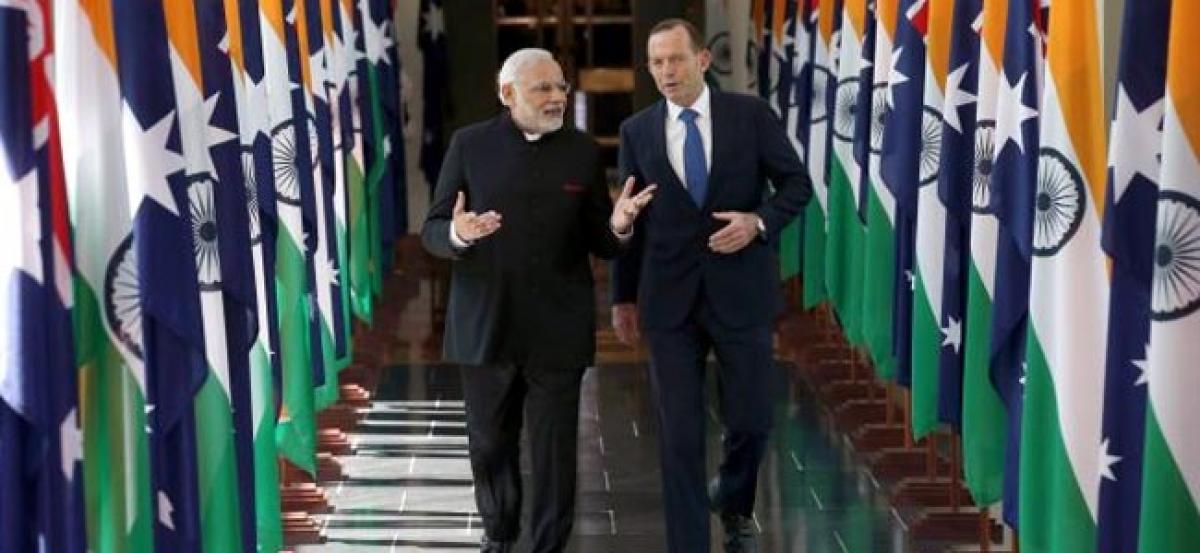Live
- AAP Announces Final Candidate List For 2025 Delhi Assembly Elections, Kejriwal To Contest From New Delhi
- Bangladesh unrest has delayed execution of some vital projects: Tripura CM
- PIL in SC seeks direction to designate BMC as sole planning, sanctioning authority for Mumbai
- 3rd Test: Centuries from Head, Smith help dominant Australia feast on listless India
- AAP final list of 38 names in Delhi: Kejriwal, CM Atishi retain seats
- Tributes Paid to Sardar Vallabhbhai Patel on His Death Anniversary at CM Revanth Reddy's Residence
- In just one year, Bhajanlal govt wins hearts of people
- CM Chandrababu announces establishment of Potti Sriramulu Telugu University
- Sutume, Kissa win World 25K Kolkata; India's Gulveer makes course record
- US accounts for 18 per cent of Indian exports in FY24
Just In

India and Australia on Monday committed themselves to deepen the bilateral defence and security partnership while Prime Minister Narendra Modi said that cooperation in education and research is a key aspect of the ties between the two countries.
New Delhi: India and Australia on Monday committed themselves to deepen the bilateral defence and security partnership while Prime Minister Narendra Modi said that cooperation in education and research is a key aspect of the ties between the two countries.
The two countries also signed six memoranda of understanding (MoUs) following delegation-level talks headed by Modi and visiting Australian Prime Minister Malcolm Turnbull here.
"The Prime Ministers committed to deepening the bilateral defence and security partnership," a joint statement issued following the talks said.
"They welcomed the significant progress achieved through the bilateral Framework for Security Cooperation agreed in 2014," it stated.
According to the statement, as fellow Indian Ocean nations, the two Prime Ministers also underscored the joint commitment of Australia and India to enhance regional cooperation in promoting maritime safety and security and welcomed the important role of the bilateral White Shipping Agreement.
"Both countries remain strongly committed to the breadth of their defence ties, including through ongoing annual staff talks for army, navy and air forces," it stated.
It also said that "the two Prime Ministers reiterated their strong commitment to combat terrorism in all its forms and manifestations, and stressed that there can be no justification for acts of terror on any grounds whatsoever".
"They asserted that the fight against terrorists, terror organisations and networks should also identify, hold accountable and take strong measures against all those who encourage, support and finance terrorism, provide sanctuary to terrorists and terror groups, and falsely extol their virtues," the statement.
In this regard, the two Prime Ministers also welcomed the signing of an MoU on fighting international terrorism and transnational organised crime.
The other five MoUs signed following Monday's talks are on cooperation in civil aviation security, environment, climate and wildlife, sports, health and medicine, and earth observation and satellite navigation.
Addressing the media jointly with Turnbull after the talks, Prime Minister Modi said that cooperation in the fields of education and research was "one of the most important aspects" of India-Australia ties.
"Both India and Australia recognise the central value of education and innovation in the prosperity of our societies," he said.
"It is no surprise, therefore, that cooperation in the field of education and research is one of the most important aspects of our engagement."
Laying stress on students exchanges between the two countries, Modi said that while Australia was home to over 60,000 Indian students, an increasing number of Australian students was coming to study in India.
On energy cooperation, the Indian Prime Minister said that he was happy "that our dialogue and cooperation in other forms of energy, including renewable energy, is on the up-swing".
"And, with the passing of legislation in the Australian Parliament with bipartisan support, Australia is now ready to export uranium to India."
He also called for working closely with members of the East Asia Summit and the Indian Ocean rim countries to pursue common interests.
On his part, Turnbull said Australia was helping India in its water management policy while sharing expertise in the area of renewable energy.
Stating that trade in goods and services between the two sides stood at $20 billion, he said there was scope for increasing this.
"We are working with India for a quality RCEP (Regional Comprehensive Economic Partnership)," he said.
RCEP is a proposed free trade agreement between the 10 member-states of the Association of Southeast Asian nations (Asean) and the six countries with which Asean has free trade agreements -- Australia, China, India, Japan, South Korea and New Zealand.
Modi and Turbull also jointly inaugurated through video-conferencing the TERI-Deakin Nanobiotechnology Centre in Gurugram, Haryana, set up by India's TERI and Australia's Deakin University.
Earlier on Monday, Turnbull was accorded a ceremonial welcome at Rashtrapati Bhavan. Thereafter, External Affairs Minister Sushma Swaraj called on him.
In the afternoon, Modi and Turnbull travelled by a Delhi Metro train to visit the Akshardham temple in east Delhi.
The Australian Prime Minister arrived here on Sunday on a four-day state visit to India.
This is Turnbull's first bilateral visit to India since he assumed office in September 2015.
His predecessor Tony Abbott had visited India in September 2014 and this was followed by Prime Minister Modi's visit to Australia in November that year.

© 2024 Hyderabad Media House Limited/The Hans India. All rights reserved. Powered by hocalwire.com







